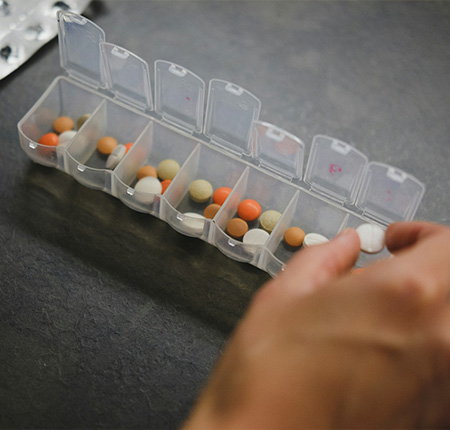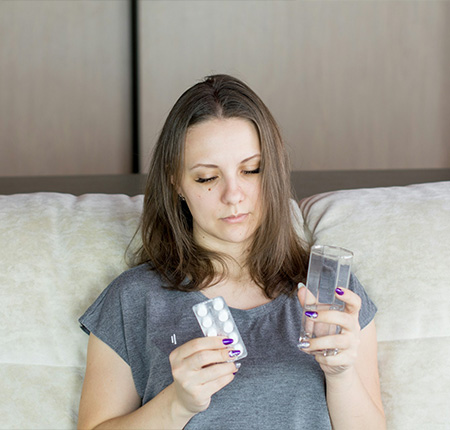
Every body needs vitamin D to be healthy. It is an essential vitamin in the absorption of calcium, so it has an important role in bone health and more. In the case of women, vit. D has many positive effects on life. And if we talk about expectant mothers, it becomes absolutely necessary to avoid a vitamin D deficiency.
The development of the baby requires a high consumption of resources and involves permanent physiological changes in the mother's body. In this sense, recent research in the specialized literature shows us that all pregnant women need vitamin D supplementation to support the growth of the fetus and to reduce the risk of complications. The topic is vast, so we will discuss it at length in this article. Find out what vitamin D helps with, what role it plays in the body and why it is so important in pregnancy.
What is vitamin D?
Vitamin D, scientifically known as calciferol, is a micronutrient that your body needs to absorb calcium and thus build strong, healthy bones. It is a fat-soluble vitamin, meaning it only dissolves in fat (not in water), with anti-inflammatory, antioxidant and neuroprotective properties.
The body can naturally produce vitamin D. But it doesn't always do so, as internal production is influenced by many factors, including skin pigment and time spent in sunlight. So it can be assimilated from the outside, from food and supplements.
Vitamin D - Types
The most important types of calciferol for health are vitamins D2 and D3. In addition to these there are many other types of vitamin D, including D1, D4, D5, D7 and D12.
Vitamin D2
Ergocalciferol, or vitamin D2, is the form of vitamin D found naturally in plants. It is obtained from a substance called ergosterol, similar to cholesterol in animal cells, which is found in the cell membrane of protozoa and fungi.
Vitamin D3
Calciferol, or vitamin D3, is actually the substance that the body produces naturally following exposure to the sun's UV rays. It is also found in this form in foods of animal origin, under the name cholecalciferol.
Vitamin D - Role in the body
As we said from the beginning, one of the main roles of vitamin D is bone health. Calcium is only absorbed in the presence of vitamin D, so it has a very important role in the formation and maintenance of strong bones and teeth.
Vitamin D also has other important roles in the body's cellular functions. Due to its properties, an optimal level of vit D in the body supports the immune system, muscle function, cognitive health and brain cell activity.

Vitamin D - Benefits
After exposure to the sun or after supplementing with calciferol for an optimal level in the body, the benefits of vitamin D are reflected in both physical and mental health. Below are the main benefits for women:
Vitamin D for women who want to get pregnant
Numerous studies have shown that vitamin D can increase fertility and the chances of an uncomplicated pregnancy. Some of this suggests that a blood vitamin D level of 30 ng/mL or higher is associated with a higher chance of getting pregnant, including through IVF.
If you want to get pregnant and want to track your body changes to calculate your fertile period, I explained all about the calendar method in another blog article.
Vitamin D and the bone system
Because it helps fix calcium in bones, vitamin D reduces the risk of bone fractures and prevents osteoporosis, osteomalacia (soft bones), bone pain, and loss of bone minerals. It is also used to treat genetic bone diseases such as familial hypophosphatemia.
The benefits are also reflected on the nervous and muscular system, as vitamin D can prevent conditions such as multiple sclerosis and muscle weakness.
Vitamin D and the immune system
Together with other essential nutrients, calciferol supports the action of vitamins A and C in the body and supports the strengthening of immunity. Thus, it contributes to the optimal functioning of the glands (e.g. thyroid, pituitary), and some studies even suggest that it can help prevent cancer.
Vitamin D and diabetes
Several studies have associated vitamin D deficiency with a high risk of developing type 2 diabetes. While another study of 100 participants, patients with type 2 diabetes, demonstrated that vitamin D supplementation can reduce insulin resistance .
Vitamin D and depression
There is some research showing that a vitamin D deficiency was also present in patients suffering from depression, which is often accentuated in the cold season when sun exposure is drastically reduced. Vitamin D therefore has benefits on depressive states.
Vitamin D and the cardiovascular system
Vitamin D supports the production of angiotensinase (or renin), an enzyme that regulates blood flow through blood vessels. A vitamin D deficiency automatically means deficient renin production, which causes high blood pressure and associated cardiovascular problems. Thus, vitamin D also plays a role in the health of the cardiovascular system, contributing to the prevention of heart disease and heart attacks.
Vitamin D and autoimmune diseases
A correct level of vitamin D in the body can prevent the occurrence of certain autoimmune diseases. These include mainly Hashimoto's disease and rheumatoid arthritis.
Vitamin D and sport
One of the most obvious links is that between an optimal intake of vitamin D and sports performance. Because it supports bone and muscle health, vitamin D supports sports activity, lowers the risk of injury or fracture, and supports muscle recovery after workouts.
Vitamin D for children
In children, the lack of vitamin D can cause a weakening of the immune system and resistance to infections. It can hinder psychomotor development and cause rickets or bone deformities. Affected structures may be the spine, skull, limbs, clavicle, and thorax. Delayed teething or tooth decay can be another effect of vitamin D deficiency in children. So it is very important to avoid a vit D deficiency.
For newborns, breast milk contains the same amount of vitamin D that is in the mother's body. If the mother has a deficiency, the naturally breastfed baby will not get enough vitamin D either. Formula-fed babies do not have this risk, because the formula is dosed correctly.
Vitamin D in pregnancy
The risk of rickets in children starts already during pregnancy if there is a deficiency of vitamin D. Also, recent studies confirm that vitamin D supplementation reduces many risks and is beneficial for both the mother and the growth of the fetus. I told you more about the baby's development during pregnancy by trimester HERE .
Studies have also found that during pregnancy, the level of 25-hydroxyvitamin D steadily decreases in the mother's body as the body adapts to the changes and demands of the developing fetus. So it is important to take vitamin D to avoid a deficiency and the associated risks, thus supporting the growth of the baby.
Why is taking vitamin D essential before and during pregnancy?
Vitamin D supplementation is recommended even before pregnancy. Research shows improved fertility in both women and men with the deficiency following calciferol therapy. We talked more about fertility and what the fertile period means HERE .
In women who do not have enough vitamin D in the body, taking it as a supplement during pregnancy supports the growth and development of the fetus, and reduces the risk of problems such as:
preeclampsia
Premature birth
Low birth weight
Gestational diabetes
Low mineral content in fetal bones
Enamel problems in children
Allergies in the first 2 years of life
ADHD

It ensures the normal neurodevelopment of the fetus
Vitamin D, like folic acid , plays an important role in brain processes and can support the neural health of the fetus. There are specialists who associate vitamin D deficiency during pregnancy with a high risk of autism, Asperger syndrome or Rett syndrome in children.
Supports the development of the immune system
Vitamin D supplementation during pregnancy can, according to some studies, support the immune system of the fetus. Thus, the risk of infections and health problems of the baby in the postpartum period decreases.
Supports bone development and mineralization
Developing strong, resilient bones is one of the main roles of vitamin D, which begins as early as pregnancy. An optimal level of vitamin D in pregnancy greatly reduces the risk of bone abnormalities and rickets in the first years of life.
Talk to your doctor about the level of vitamin D in your body from the first signs of pregnancy . Find out if you need a supplement and in what quantities, so that after birth you can hold a healthy baby that has developed harmoniously.
Symptoms of deficiency (deficiency) of vitamin D
Vitamin D deficiency can lead to serious health problems and accidents, so it's good to notice the signs early. Such a deficiency is usually manifested by:
Causes of vitamin D deficiency
Vitamin D deficiency can occur very easily in winter or when a person spends a lot of time indoors, protected from sunlight. Without supplementation, the body does not naturally produce vitamin D and thus a deficiency occurs.
However, this is not the only cause, because there are also certain diseases that decrease the level of vitamin D in the body. So here are the most common causes:
- Minimal sun exposure
- Cystic fibrosis
- Celiac disease
- Crohn's disease
- Obesity
Risk factors for Vitamin D deficiency
The level of vitamin D in the blood depends on a lot of internal and external factors. The groups of people most prone to a deficit are those who present the following risk factors:
Sources of vitamin D
The body naturally produces vitamin D from exposure to sunlight.
But this production is influenced by factors such as skin pigment, your location and the time of day you are exposed. If you do not spend enough time in Nature, if you use sunscreen (which is essential to protect the skin from UV rays) or if it is winter and the sun is not strong, the natural production of vitamin D can be completely lacking.
Therefore, there are other sources: foods that contain vitamin D (either naturally or because they are fortified with vitamin D) and vitamin D supplements.
Foods that contain vitamin D
Calciferol is found naturally in many animal products, but also in plant products. Among the foods richest in vitamin D are:
Fatty fish: salmon, halibut, mackerel
Red meat
Liver (but liver should be avoided in pregnancy)
Small fish: herring and sardines
Fish oil: cod liver oil
Canned tuna
Eggs: The yolk is rich in vitamin D
Mushrooms: according to studies, they are the only vegetable source that contains a sufficient amount of vitamin D
Foods fortified with vitamin D: soy milk, orange juice, cereals and oats
Vitamin D supplements
Another important source of vitamin D is supplements. These can either come in the form of multivitamins, along with calcium or a whole complex of vitamins and minerals, or simply in the form of vitamin D.

The required dose of vitamin D
Because the absorption level of calciferol varies depending on various factors, so do the recommended dosages for supplementation. Thus, the required dose of vitamin D differs for everyone depending on each person's age, health and lifestyle.
For healthy people, the general recommendations are those in the following table. However, your doctor may recommend a different dose of vitamin D, depending on your own needs.
Age | Recommended dosage |
Children aged 0 to 12 months: | 10 mcg (400 IU) |
Children over 12 months of age and adolescents: | 15 mcg (600 IU) |
Adults aged 18-70: | 15 mcg (600 IU) |
Adults over the age of 70: | 20 mcg (800 IU) |
Pregnant or breastfeeding women: | 15 mcg (600 IU) |
Frequently asked questions about vitamin D
One of the most frequent questions about calciferol is "when to take vitamin D". It is generally recommended to take it with a meal, not on an empty stomach. Being a fat-soluble vitamin, it does not dissolve in water, but is absorbed only with the help of lipids (fats). Another recommendation is to take it in the first part of the day so as not to affect sleep, so the first meal is an ideal time.
If you're looking for other answers related to vitamin D, here are some other frequently asked questions:
How long does a vitamin D treatment last?
It generally takes several weeks (up to 2-3 weeks) of daily calciferol for vitamin D levels to increase in the body. In the case of severe deficiencies, it may take up to several months for the results to indicate an optimal level.
According to studies, vitamin D in the body of patients with deficiency reached normal values after 12 weeks of high-dose supplementation.
How is vitamin D deficiency tested?
The best indicator of vitamin D levels in the body is 25-hydroxyvitamin D. This can be measured using blood tests.
What happens if you take too much vitamin D?
Vitamin D supports calcium absorption. Which means that when taken in too large amounts, excess calciferol will increase the level of calcium in the blood. This can lead to loss of appetite, nausea, vomiting, frequent urination, dehydration, excessive thirst, muscle weakness, pain or kidney stones. In rare cases, it can also cause arrhythmia, kidney failure or soft tissue calcification.






















